Don't wanna be here? Send us removal request.
Text
Major fan of the fact that Killua probably canonically has feelings for Gon, btw.
43 notes
·
View notes
Text
I was talking abt this in a comment section a bit ago. But I really think part of the appeal of Hikaru’s character is the fact we don’t know anything about him for sure. He’s almost a complete stranger to the audience.
We don’t know if he had feelings for Yoshiki, we don’t know if his girl-loving carefree demeanor was entirely a facade. He might’ve cared for Yoshiki strictly platonically, or he might’ve been just as repressed and fully in love. Might’ve been something else going on entirely. But that’s the point.
Most of what we know about Hikaru is from Yoshiki’s perspective. And even then, it’s mixed and muddled and full of difficult feelings. Some parts he says Hikaru was open, confident, and expressive; like a main character everyone loved. In other parts he says Hikaru was hard to read, mean, and told lots of lies. He said at one point he couldn’t even imagine him crying, but another time he said he “wondered if he really wanted to”.
Plenty of things hint at something deeper within him, something that bled out into “Hikaru’s” feelings- but we might never know the extent of that.
And I was thinking, if we ever did get more context, if we got confirmation of the things we suspected in him- it would be therapeutic yes, but would it be right to know that much?
Part of what makes Yoshiki’s grief so heartbreakingly real is the fact he will never get the answers and closure he so desperately wants from Hikaru. That’s one of the most painful parts about losing someone. The fact he has so many questions and unanswered feelings that will never be heard properly.
We can theorize and interpret him however we want, but it’s always going to be an extension of Yoshiki’s perspective; and a deeply troubled, insecure, and repressed queer kid might not have the most accurate idea of him. He might put him on a pedestal because of his feelings, or even resent him in some way; remembering him colder, or warmer, than he was.
We don’t know because Yoshiki himself doesn’t know. And it’s too late to ask now. But that’s the reality of grief, isn’t it?
70 notes
·
View notes
Text


Ohhhhh to have the boy you have a crush on laying on your bed, smiling, looking up at you with a hand around your leg and resting on your knee reach up to brush your bangs aside and call you handsome
5K notes
·
View notes
Text
Wrote half an essay after seeing the discourse on the different interpretations of the classroom scene and ‘Hikaru’ and Hikaru in general
Sometimes I see people on twt make posts about tshd that make me unreasonably angry (and then I take a deep breath and stop myself from picking a fight with a stranger on the internet about the fictional characters we both enjoy lol)
But I think one of the main things that makes The Summer Hikaru Died so interesting to analyze is that the story is told on two levels at once and sometimes the two contradict each other in what you want to happen
On the one hand you have the actual events of the story as they happen, a closeted Highschool boy realizes that his best friend and crush is dead and has been replaced by a mysterious creature and both of them build a deep relationship (while Yoshiki comes to terms with the loss of his friend and his feelings about this new ‘Hikaru’ and ‘Hikaru’ develops his own identity and relationships) and try to figure out what is happening in their town
On the other hand you have the whole story (both as a story and through individual scenes) being a metaphor for the experience of growing up closeted in a small traditional rural community and working through the external hurdles and internalized homophobia that comes with it, with the general goal of self discovery and existing as the truest happiest version of yourself
What you sometimes get is that because the themes of the metaphor also exist in the literal face value version of the story, people try to assert one aspect of the story over the other, something that is pretty common for every story where an outsider or minority analogy is drawn with the help of a non human creature (especially in a horror context)
The classroom scene from episode 3/chapter 6-7 was something a lot of manga readers were worried would be misinterpreted by new viewers and it is a perfect example of these two narratives playing out at the same time
On the first level you have the events themselves:
Yoshiki is warned by Kurebayashi that getting too close to the entity that came down from the mountain is dangerous for himself and the village, so he tries to distance himself from ‘Hikaru’.
‘Hikaru’, not realizing this is happening and not wanting to lose the first person he’s made a meaningful connection to, both as himself and through og Hikaru’s memories (who is also arguably the reason he got the chance to live this new life), goes looking for him and finds him while Yoshiki is deep in thought about his conflicting emotions. Yoshiki lashes out, because he’s scared, grieving, growing attached to the ‘Hikaru’ he’s spent the last 6 months with and feeling guilty for that last emotion, saying something true but hurtful to ‘Hikaru’ and pushing him away.
‘Hikaru’, confused by human emotion and the blurred line between his own emotions and the remnants of Hikaru’s, and hurt by being pushed away loses control, has an outburst and instinctually (partially because he’s the person who hurt him with his words, partially because as we see in 37-3 and 23/24 it’s what comes naturally to him when weakened, partially probably cause he did tell Yoshiki he would kill him if he told on him) tries to consume Yoshiki, giving him a short insight into his memories of the Indou ancestor and hichi-san, before stopping himself in horror at his own actions, stating that he can’t consume Yoshiki (and kill him) because he cares about him and begging him not to hate him
On the second level you have the scene as a metaphor for internalized homophobia and awakening sexuality:
The closeted teen is inundated in a conservative environment telling him that homosexuality is dangerous and unnatural, so he represses his emotions. He has an encounter with a different queer person he’s friends with (or who he might have had a previous romantic encounter with) who is further along in accepting their own sexuality and does not have his emotional hangups. He lashes out at them because of his own internalized homophobia, calling them a creep and pushing them away because they remind him of things he is trying to repress
The openly queer person tries to initiate (conversation or a more romantic encounter) (not necessarily in the same interaction like they do in the actual scene) and the closeted person is initially scared and disgusted because of the homophobia they’ve internalized from their environment but finds himself enjoying the experience
Those are the two general levels of the narrative, with some fluidity in the second level cause it’s not only strictly applicable to one specific situation
The core conflicts that happen when you try to condense the two are these:
‘Hikaru’ is a potentially dangerous creature, who, while not malicious, has already killed one person that we know of in the story. This is a conflict that happens every time you use a supernatural creature that is removed from humanity to represent aspects of a minority group, especially in a horror setting. While homophobes have no real excuse to be touting their homophobic bs, the concerns Kurebayashi raises are reasonable with the little knowledge they have, and while it later turns out that ‘Hikaru’ is not causing the incidents, in his disembodied state in chapter 37-3 he would have taken Yoshiki’s soul so that instinct is there. There is a perceived danger in overcoming prejudice and changing but that stems from an unreasonable fear or change, not from actual danger (and from fear of being judged but analyzing internalized homophobia in its entirety is too much for one tumblr post lol)
Yoshiki is also still coming to terms with the literal death of his lifelong friend and secret first love. While this can be translated to the grief for a past self, or grief for a past relationship before moving into a new one, both of those feelings are a more ‘healing’ kind of grief than having actually lost a loved one before their time
The last conflict, which is what a lot of people were worried about is that the metaphor doesn’t necessarily apply to the story in a straightforward linear fashion. People were worried that first time watchers would take the classroom scene as metaphorical sexual assault because of the way ‘Hikaru’ loses control of himself and attacks Yoshiki, an interpretation that would perpetuate the harmful “gay men are predators” stereotype.
But that interpretation only happens if you link the two narrative levels too closely together, keeping the timing of the literal scene while you interpret the “mixing” as a direct parallel to a sexual encounter. But discovering your own sexuality and coming to terms with it is a slow process, that takes a lot of people a long time and multiple interactions with other people to figure out. A metaphor doesn’t have to cling to all of the literal aspects of the text to do its job well and Yoshiki needs a legitimate reason to be scared in the actual text for the more unreasonable metaphorical fear of change element to be brought up.
In a more general sense, some people like to interpret ‘Hikaru’ as a representation of freely expressed queerness, while og Hikaru and the village represent Yoshiki’s closeted status quo and outside pressures, something which works on a lot of levels but isn’t flawless (especially in the case of og Hikaru, who we know very little about but whose memory affects the story to this day, with Yoshiki having a traumatic flashback to finding his body in the latest chapter)
‘Hikaru’ is also done a disservice if he is only viewed as a metaphor for freely expressed queerness in relation to Yoshiki because his experience forming his own character&relationships and figuring out what he is and what he wants to be, while at the same time being taught human morals (something which the characters themselves debate) also represents then quintessentially experience of coming of age in general. He is also a lovely and complex character in his own right whose journey I care for deeply
In short, in a supernatural horror story, you have to raise the stakes compared to the intimate personal stakes of figuring out your sexuality and identity, something which Mokumokuren does very well. As a result you have to be careful not to go too one for one between the actual plot and the metaphor being told in the story
Of course, no story can be fully interpreted until it is complete, and depending on how Yoshiki and Hikaru’s story ends, we might draw some slightly different conclusions at the end
138 notes
·
View notes
Text
SPOILERS MANGA OF TSHD BTWWWWW OK OK IM SO NORMAL
One of the tragedies abt the story I think often is the conflict with the OG Hikaru feelings that differentiates him than“Hikaru”. The fact that the original one was hinted to be just as closed off and ashamed abt his feelings for Yoshiki and trying to brush it off just like Yoshiki does with the difference, which hurts that he was described to be friendly and talkative with anyone, and his family tradition abt “marry someone right away”or they will be taken away is something that adds more doom to his death, in his last moments being probably the only time he was able to express his true thoughts and emotions.
his last words were a simple wish, for someone to stay with yoshiki on his side (even worse in chapter 0, which is a pilot/ retconned part of the story, he does straight up confess to the entity that he liked Yoshiki) and “hikaru” granted this wish, of course , the only moment he was able to let out what he was truly feeling was being all alone , in a forest, in the brink of death with full of regrets abt what it could have been, I can’t really blame him tho, as he’s just the example of a teenager forced to fit into society norms setting up ideas onto the village they’re living, not allowing the possibility for both boys to truly express their love. “”hikaru” by the beginning of the story express what the original was feeling and Yoshiki is left with emptyness abt it
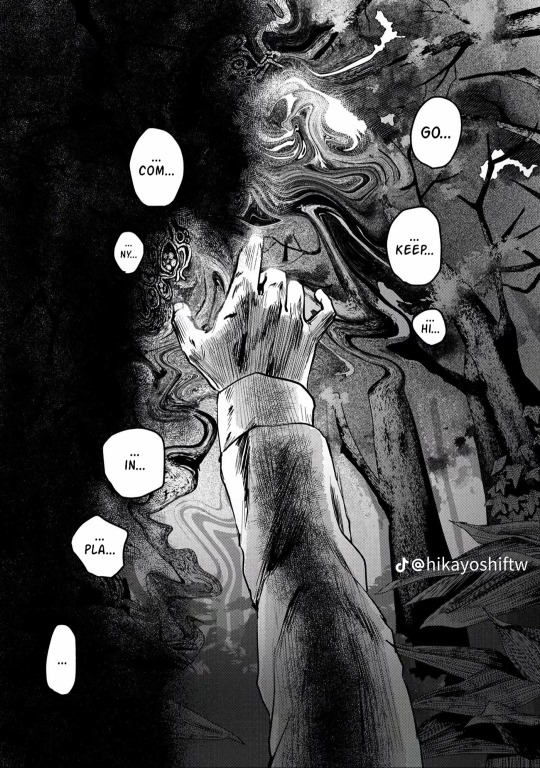
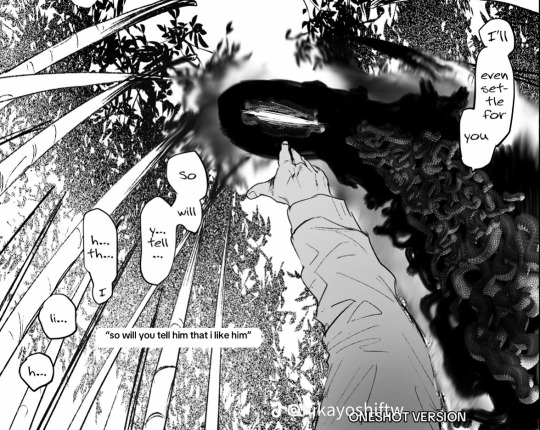
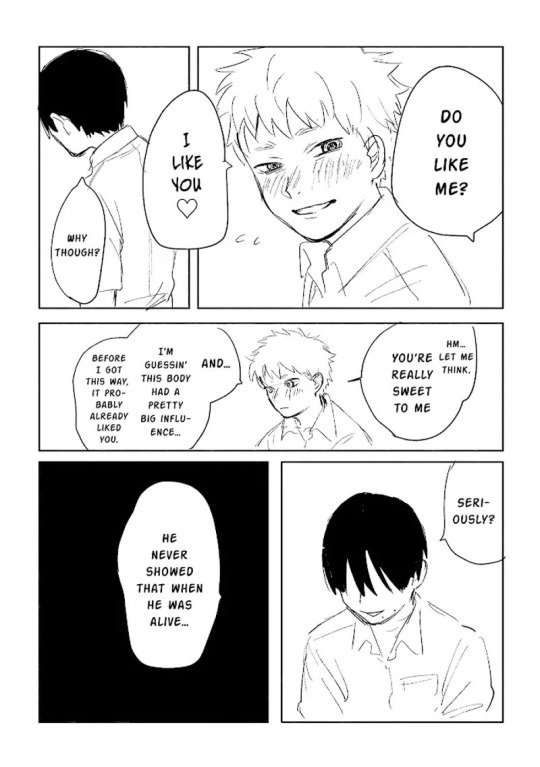
Hikaru” on the other hand, is a person who, of course, being an entity , doesn’t have any sort of idea of how humanity and especially society norms works and with the development of the story, “Hikaru” is able to express what he feels for Yoshiki openly as “the monster feelings” and not originally hikaru’s, as for example this part which makes me sick abt “hikaru” trying to understand what he’s feeling is his or the original.
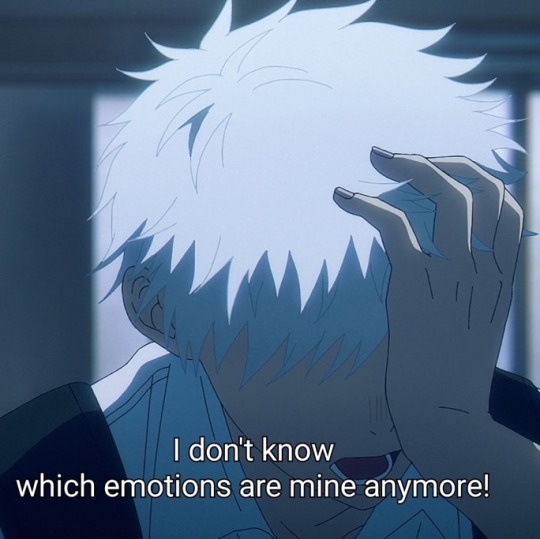
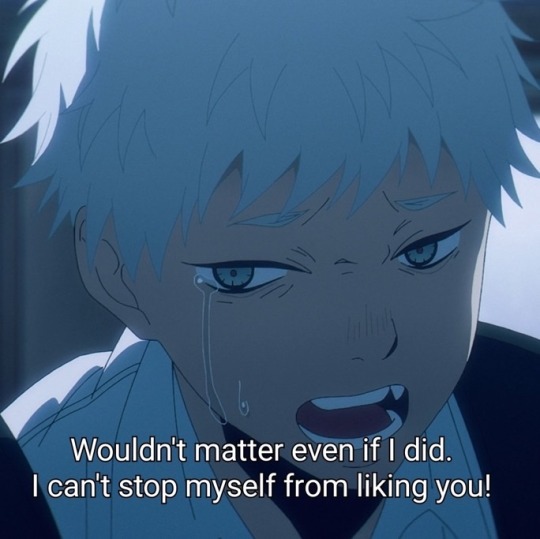
Even if both are unsure and confused how they’re supposed to feel eachother ,”Hikaru” still talks abt how his face is handsome and his moles and try to learn abt him and how humans feels for the sake of this guy who was left initially with suspicious and denial to then fully embracing “Hikaru” as who he is, not as Hikaru replacement but as a new person, a new individual who helps Yoshiki moving forward and to love again, openly. Their bond is very special
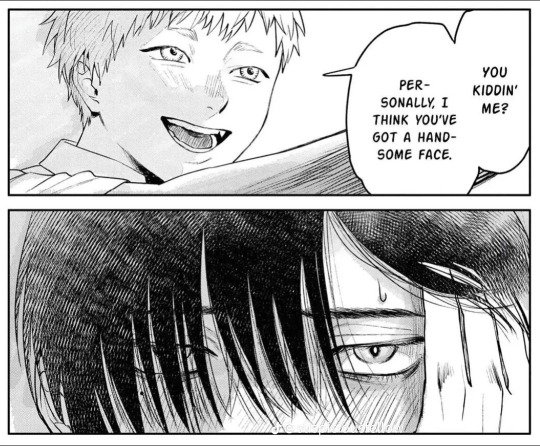
and the thing Is, which Is so bittersweet is that being with “Hikaru” is probably a better option for yoshiki due to how outspoken he is abt his love and appreciation for the boy, if the og one was there, nothing would have happened but with “hikaru” is different , that, of course doesn’t mean that Yoshiki is forgetting the og Hikaru but he’s simply starting to accept his death (showcased by the sunflowers). Perfect rappresentation of the stages of grief.
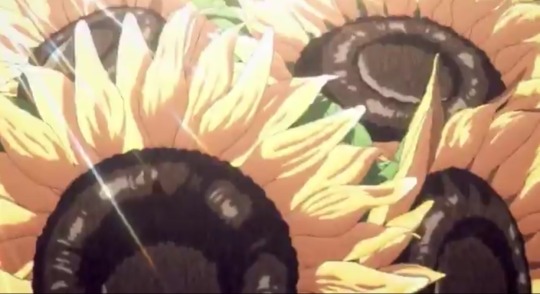
and I believe Yoshiki will always remember the og Hikaru with fondness and possibly sorrow for what it could have been if both would have been more open abt eachother, if the village wasn’t so much cruel to them. Im genuinely so happy for both “Hikaru” and Yoshiki development and the way they want to be with eachother for the best and the worst (and visit all sort of places, that scene where yoshiki wish for “Hikaru” to return back after he enters the hole) which I think it will bite them back later on in the manga prob but I believe the og Hikaru and Yoshiki had a way more doomed story. I also believe that Hikaru would have been happy to see Yoshiki with “Hikaru”, someone that express those feelings openly that he was so much ashamed to say and never dared to mention when he was alive and it’s so bittersweet. I love them so much
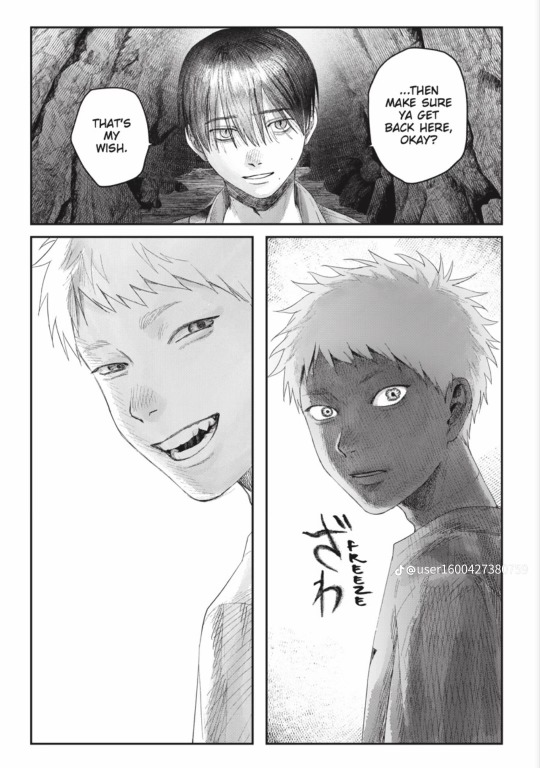
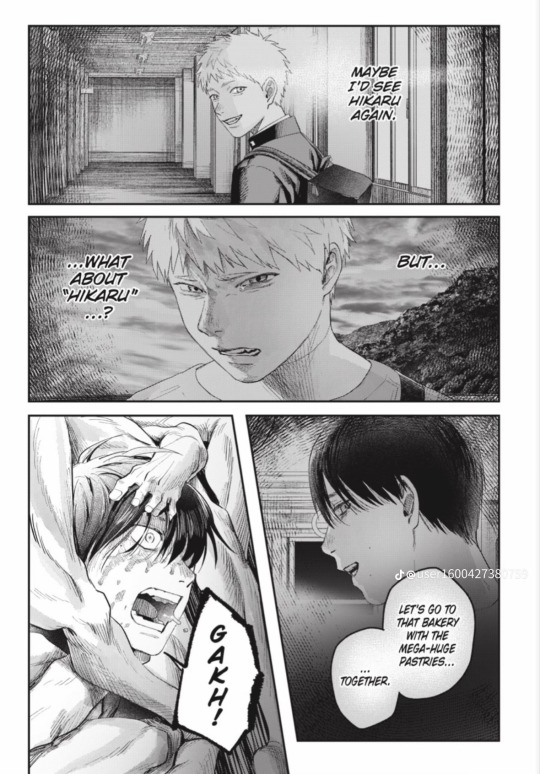
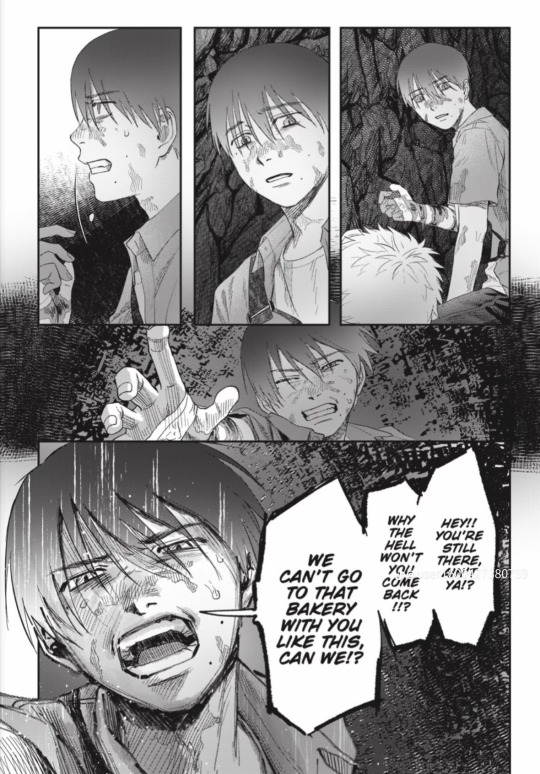
They make me genuinely sick oughhhh
61 notes
·
View notes
Text
Everyone who talks about The Summer Hikaru Died analyzes it through the themes of closeted homosexuality, and while that is a core theme, to me it’s not the main one.
Grief is.
The first three volumes of the manga explore the unique complexities of grieving someone who isn’t exactly lost to you, but is gone nonetheless. Yoshiki spent a week keeping the fact that he found Hikaru’s corpse to himself, then MONTHS treating this ghost/spirit/demon thing like his dead friend. Only after he finally confronted it did he truly begin his healing process, complete with silent breakdowns, separating “Hikaru” from Hikaru, talking through his pain, and finally, making a grave.
I get that discussing LGBTQ+ themes is more fun, but TSHD’s exploration of grief is what really drew me in. I don’t want it to take a backseat.
118 notes
·
View notes
Text
Smth about how tshd uses horror, such a fitting theme to explore homosexual attraction...
Loving a monster as a metaphor for loving the same gender, the wrongness of it all, the sin, the guilt- especially when you live in a small village that's conservative; you're brought up thinking you're wrong, faced with the judgment of the people around you who constantly invade your privacy and cross your boundaries. Hell you have supernatural shit to think about AND unresolved homosexual feelings towards your best friend and that monster wearing your best friend's skin.
And you? You’re still a teen trying to figure out your own feelings and your place in the world. But time doesn’t stop for you, it doesn’t stop for no one.
You look at your best friend that’s dead but somehow still breathing. You know he isn’t him, but you’re at a loss on what to do. They tell you he’s dangerous, and you try to get rid of him. But over time you grow fond of this monster and start getting over your grief. You start seeing the monster as it’s own entity, separate from the best friend that was your first love. And with that came acceptance, a sort of bitter conclusion that you’re in too deep now to let go
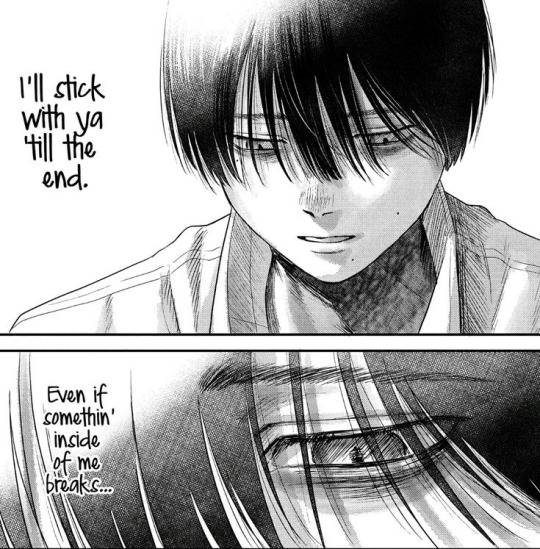
175 notes
·
View notes
Text
God the fact The Summer Hikaru Died is so ready to swap the medium and style and camera perspectives and angles it's using to set the mood is driving me wild in the best way possible. Like wow what a cool adaptation. What a cool adaption using everything in its toy box to maintain the vibe of its original manga. It's gorgeous and unsettling and I'm genuinely so blown away so far.
3K notes
·
View notes
Text
why do people keep calling hikaru and yoshiki “queer-coded” …coded??? they’re QUEER. this shit is literally in your face. romantic or platonic, whatever these two have is far more sinister anyway.


177 notes
·
View notes
Text
everything genya does reminds me over and over why sanemi would destroy himself inside out to spare and save him. what do you mean he wasted his life running after the ghost of his brother, ate demons and endured gruelling training and endless pain to reach him just to apologize for something he said unwittingly when he was a child, what do you mean he punched zenitsu for bad-mouthing sanemi even after the latter tried to gouge his eyes out, what do you mean genya used up his last breaths and moments on the planet to comfort and thank sanemi what do you mean w h a t d o y o u m e a n WHAT DO YOU MEAN
55 notes
·
View notes
Text
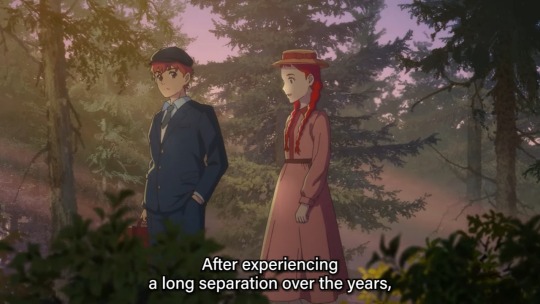
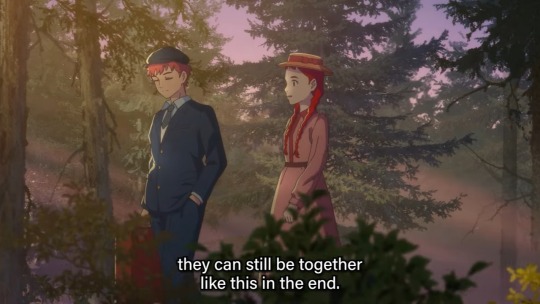
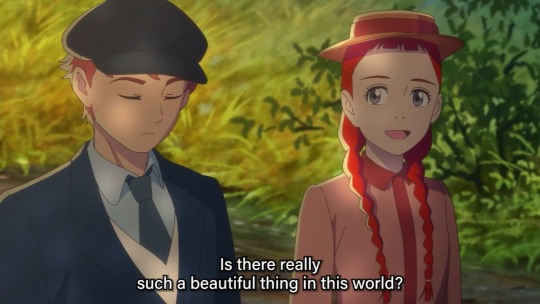
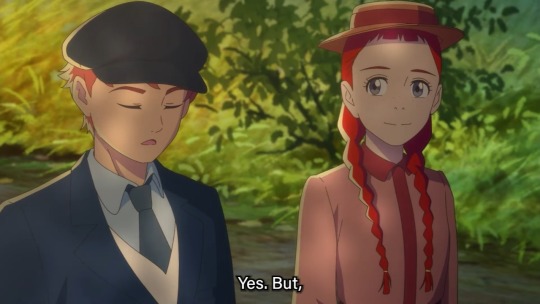
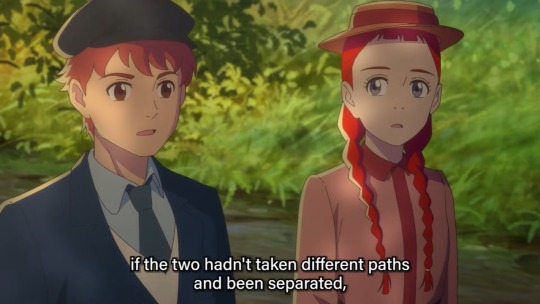
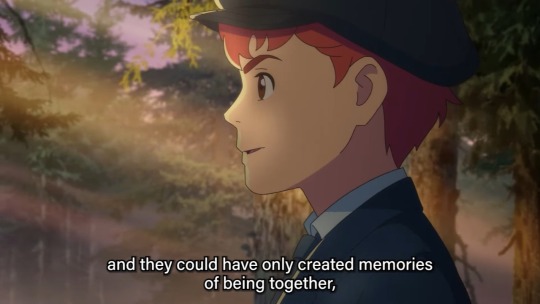
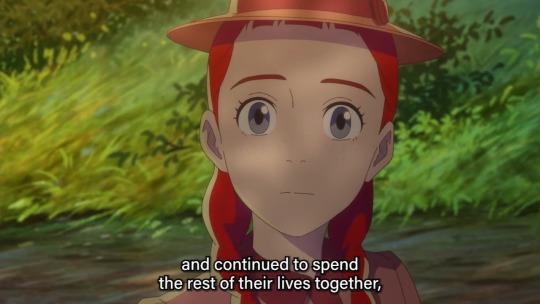
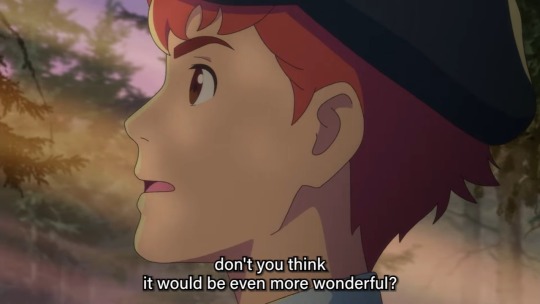
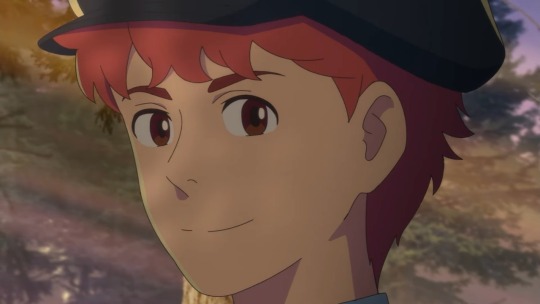
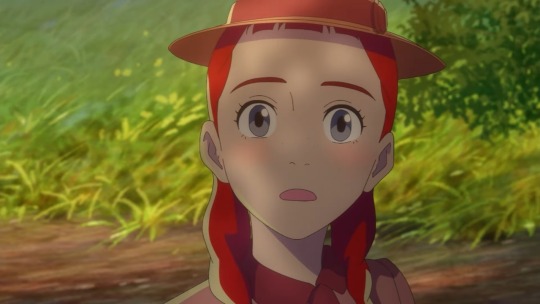
"For a moment Anne’s heart fluttered queerly and for the first time her eyes faltered under Gilbert’s gaze and a rosy flush stained the paleness of her face. It was as if a veil that had hung before her inner consciousness had been lifted, giving to her view a revelation of unsuspected feelings and realities. Perhaps, after all, romance did not come into one’s life with pomp and blare, like a gay knight riding down; perhaps it crept to one’s side like an old friend through quiet ways; perhaps it revealed itself in seeming prose, until some sudden shaft of illumination flung athwart its pages betrayed the rhythm and the music, perhaps . . . perhaps . . . love unfolded naturally out of a beautiful friendship, as a golden-hearted rose slipping from its green sheath."
— "Anne of Avonlea" Chapter XXX "Wedding at the Stone House"
Scene from "Anne Shirley" Episode 15 where Anne and Gilbert go home after the wedding of Mr. Irving and Miss Lavendar.
84 notes
·
View notes
Text
as a duo gyomei and genya match each other well; gyomei's firm dignified and sturdy nature works as an anchor to genya's hot temper and childishness while genya helps gyomei to lower his walls and invite trust in gradually through his honest hard-working and simple nature, they both are good for one another but I also believe they take their time to earn one another's love and closeness as both of them are very complex and wounded people, even after they have warmed up to one another I imagine there will still be moments of messiness despite the consideration they have for each other which is exactly the reason their bond is precious because it is a safe place for both and the closest thing to a family after all the loss they endured, they share a genuine connection
20 notes
·
View notes
Text
Sanemi's downfall is a blend of his selfless and self-harming nature
the distance sanemi creates between himself and genya isn't strictly about protecting genya, and it isn't by far the only way either, he even contemplates a different way in the light novels but settles on violence nonetheless because in his own eyes he's the one with the dirty hands, he is the jerk -despite his evident gentle and caring nature- the rift between the shinazugawa siblings cannot be simply amended by talking it over because it stems from his self hatred, his own belief that he is unworthy of love, care and closeness, which he rationalizes by the fact that even the strongest of the slayers are still at risk of dying which means in genya's case, who can't use a breathing style and is extremely kind, the chances of that happening are even higher.
His fake cruelty towards his brother unknowingly affirmed genya's insecurity (his weakness), meanwhile reinforcing the horrible image he garnered, it's a self-imposed punishment, doubling down on his pain by not allowing himself to enjoy the remnant of the family he assigned himself protector and provider of and failed.
A role which was also imposed on him; living an impoverished life defined by being the eldest brother of many small hungry scared children with no proper father figure, being the child of a man who inflicted verbal and physical violence on them, who was never dependable. Being the child of a hardworking, protective mother who deserved a pillar that she could lean on at least partially, all this creating a child who wished to be the opposite of his own father and a solace to his family, a child who was never allowed to be one.
To top it all, the fateful night happens and he manages to save no one, he fails them, they all die on his watch after the promise he made them. All, except for genya who becomes the symbol of his failure and dreams, he becomes the last part of his true old self and purpose, he is everything, so if genya perishes then his life is meaningless, so for genya's sake he fights, he braves years of pain and loss because if his little brother lives happily then everything he endured becomes bearable, justifiable even.
All of this weight that sanemi assigns to genya's survival, while understandable, is suffocating. He creates this ideal version of the life he desires for him disregarding his brother's wishes, refusing to adjust the plan or reshape it, he single-handedly carries the blame, all the pain and the burden, ignoring the possibility of genya's capability and desire to share it, meanwhile insisting on breaking his brother's heart to keep him as far away, hurting the both of them in a horrible fashion but in the only fashion he knows and insists suits him.
Sanemi's ways are contrasted by his foil tanjiro who chooses openness, softness and, with nezuko constant encouragement, leaning on others despite his own ups and downs and throughout all the hardships.
To summarize, sanemi punishes himself for his self-perceived fault by isolation and carrying it all on his shoulders thinking that by doing so he's sparing his gentle precious sibling, but instead he punishes him as well, thus he is punished by a narrative which constantly advocates for vulnerability and dependency by taking away genya right from his hands as a last proof that no matter what you do, controlling fate is futile so it is better to accept our mortality and be the kindest versions of ourselves while we can and while it's impossible to keep our loved ones out of danger we can still love them.
So, despite himself sanemi lives and genya and masachika's will persist, after the war when there's no longer a need to slay demons, to use violence or sacrifice himself, sanemi is asked to create his own purpose and happiness freed of the duty he took on since he was young and he is given all the opportunities in the world to live for himself like all his loved ones wanted for him.
111 notes
·
View notes
Note
Something that caught my attention in the Nezuko-Sanemi interaction in the ending is that when he remembers Genya by Nezuko's reaction and words, baby Genya also adds "because then i dont get hungry". Its interesting how gtg added this line, maybe im reaching too much but maybe Genya (and Sanemi) had to starve himself because there wasnt enough food/as one of the elders he gave his food to the little ones so sleeping was a method to stop his hungriness
See, I don't think you're reading too much into it at all. I think that line was very deliberately placed. Gotouge does not pull any punches when it comes to depicting the Shinazugawa's poverty.
We see very little of the Shinazugawa's background but what we do see is all painting a very very distinct picture.
The Shinazugawas were what are known as hinmin during the meiji period. (or the extremely poor)
Let's start with where they live.

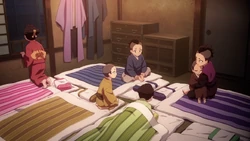
In the light novel, Genya mentions that they live in a longhouse: "...bit of a walk from the longhouse we lived in." (pg 112 one winged butterfly)
Based on appearance and description, we can conclude that they were living in what's known as a Nagaya. Nagaya were Japanese rowhouses/longhouses that were built during the Edo period. (here.) They were cheap and designed for single tenants, containing only a single room of approximately 8-10 square meters and a small kitchen.
Now, there's an important distinction to be made: if Genya had meant a Machiya, (a more modern and larger version of the rowhouse) it likely would have been translated to townhouse in the light novel as that is the direct translation whereas Long House is the direct translation for Nagaya. Nagaya was reserved for specifically poorer areas and was associated heavily with poverty during the Meiji era.
It should be noted that Nagaya were intended to be rented out by tenants that didn't have a family, and thus would have a much smaller income.

Even in the light novel it's shown that Genya and his family are bullied for being poor based on the interaction with him and the landlord's son. "The whole 'poor people with tons of kids' thing."
We know that Sanemi works to make money for the family despite also being a kid and we can see in the flashback that he's pulling what's known as a rickshaw. Even in the sketch that was released, Sanemi was shown pulling a rickshaw there as well.
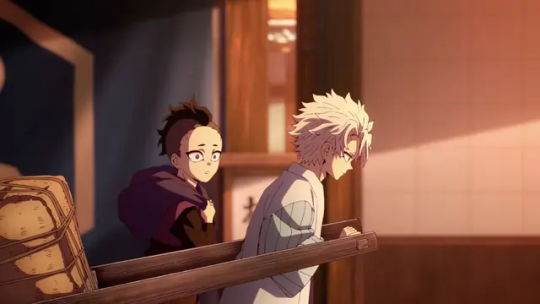
Rickshaw pullers, called shafu, or "human horses" by appalled foreigners, made their living renting out a rickshaw to pull people or supplies (though usually it was people they pulled around). Horses were extremely expensive and cars were rare during this time and Kago were starting to go out of style.
Shafu were known for their extreme strength and endurance, something we can definitely attribute to Sanemi, even at a young age. Unless they were employed by someone of high status, they made very little money, often having to rent out even their jackets.
Women in Meiji Japan made very little money, only able to support an average of 1.5 people on their wages alone, which falls devastatingly short of the seven that Shizu needed to support. Under the Meiji ie code at the time, Sanemi would have been the head of the household and thus the main breadwinner for the family.
It was unlikely that even when Kyogo was alive, he brought much to the table, based on how frequently he was referred to as a good-for-nothing father. He was likely driven to become a drunkard by the stress of poverty, though that certainly does not excuse him from being an abuser.
We can very safely conclude that the "I'm not hungry when I sleep" line was very much an intentional reference to their poverty.
I will link some of my sources:
Here. Here. Here. Here. Here.
Also, I'd like to apologize for answering my asks a little out of order: I happened to have already done a bunch of research into this topic for my fic before this ask was ever sent in so I was already prepared to answer it! I promise I'll get to all my asks though; I appreciate each and every one of them. It's just that a few are a little harder to respond to than others!
31 notes
·
View notes
Text
I don't think Genya would have survived, even if Sanemi had taken him under his wing like he considered at Masachika’s grave. That's not the point of the story. KNY is about how the world is cruel and human lives are impermanent, how we’re going to suffer and experience loss, but we have to live our lives as fully as we can. It’s about willpower and choices.
Yes, things might have turned out differently if Genya had been under Sanemi’s guidance, but there's no guarantee. That’s just how life is, and that’s what the story is really about. It’s not about just surviving but about making choices. Which is exactly what Tanjiro tells Sanemi "Didn't you say earlier you don't have a little brother!? then keep your mouth shut about what Genya chooses! whether he has a talent or not, he decided to risk his life to fight demons!"
This theme is woven through many characters in the series. For example even though Tanjiro is scared for Nezuko and wants to protect her, he still lets her make her own choices and he maintains a deep understanding of her will. The opposite could be said about Yuichiro, whose harshness towards his brother was his way of protecting him Muichiro dies young after becoming a Demon Slayer, but there is no way to know that if Yuichiro had lived and kept him from becoming a Slayer, he would have lived a long life Muichiro might have died young anyway, from illness or an accident.
Even if Sanemi had kept Genya out of danger one way or another, there’s no assurance that Genya wouldn’t have died young regardless. The point is that while self-preservation might give us more time, we are not immortal. We can’t control when we die, but what we can control is how we spend the time we were given.
The Shinazugawa brothers’ story was always about willpower, choice, and autonomy about trusting others, letting them make their own decisions, and letting them take care of us. What could have been different if Sanemi had allowed Genya to follow his own path was the time they could have spent together a lifetime of closeness and gentleness that he deprived both of them from. This is in contrast to the Kocho sisters. Kanae couldn’t change Shinobu's fate, but she allowed her sister to be her sister and made sure they stayed together, which gave them more time with each other.
Whether it’s Genya Muichiro Nezuko or Shinobu they were going to meet their fate regardless of what their older siblings did. What really matters is letting others make their own choices and supporting them along the way.
63 notes
·
View notes


